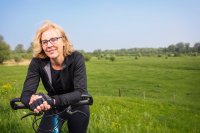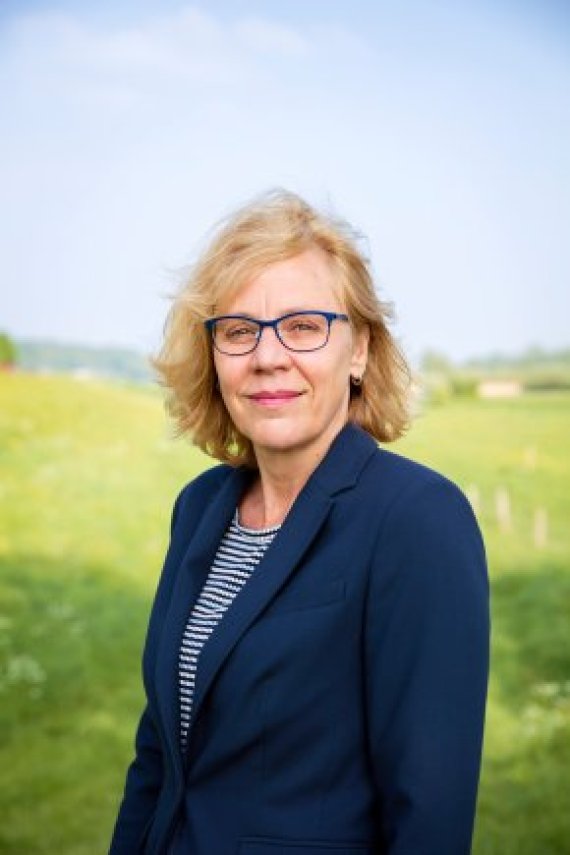Photos: Maurits Giesen
The going is good for Imke de Boer (52) these days. In recent years, the professor of Animal Production Systems and her colleagues have developed a new vision on the role of animals in our food system, with an emphasis on optimal use of resources (see inset: Sustainable livestock farming). This proved to fit the bill for the current agriculture minister Carola Schouten, who wants the Netherlands to take the lead in circular agriculture. So De Boer is run off her feet at the moment. She is much in demand as a speaker at events for farmers, politicians and scientists, she recently discussed circular agriculture with Minister Schouten at a meeting in Amsterdam and she and Martin van Ittersum gave the Mansholt lecture for European policymakers in Brussels, on circular agriculture. Due to her full diary, we met in Impulse on Wednesday afternoon, at the end of her ‘work-at-home day’. It is a hot day and we order two cokes.
I was always ambitious: I wanted to bring up my children well
What is your greatest passion?
‘What matters most to me in life is my children, my partner and the rest of the family. That is why for a long time, I worked part-time at WUR, until my youngest child went to secondary school. I have three children: twin girls of 26 and a boy of 23. Until 2008 I worked three days a week, then I went up to four days. I only started working fulltime in 2011, when I became professor. I am pleased that I spent that time with my children.’
Where you less ambitious then?
‘Yes, that’s what people ask, as if you can only be ambitious in your job. I certainly was ambitious: I wanted to bring up my children well. I love my work, but I also loved being at home with the children. Young women sometimes ask my advice on whether they should choose for their careers or their children. My answer is: there are no shoulds, you should follow your heart. For me it felt good to spend part of the week at home. I think staff with small children have a harder time of it now. I was an associate professor and of course I wanted to do my work well, but I didn’t have to meet the demands of tenure track. I try to support the young members of staff in my group, but I can see that it’s really tough. They all work four days a week and tenure track does put them under pressure.’
Eventually you started on tenure track yourself. Why?
‘I was 44, the girls were in their last year at high school, it was a turning point. I wanted to develop further, but I wasn’t planning on becoming a professor. I wanted to study the role of animals in the food system and for that, systems thinking is essential. That is the specialism of Animal Production Systems, but I saw that our group was not visible enough in the debate. That’s how I started on tenure track. My first goal was to set up good quality research, in other words to look for very good PhD students and young staff. And after that it’s just a question of working hard on the quality of the research.’
How did you manage that?
‘I have a lot of energy. I don’t have ADHD, but when I was little my mother often said, you just go and run 10 times around the block. I am also quite critical. I want to help the PhD students with everything and I try to get the best out of everybody using positive feedback. That pays off. In the past few years we’ve had two PhDs with cum laude and we got a Veni grant in our group. That hadn’t happened in 25 years. Quality is the foundation.’
What kind of manager are you?
‘I just act normally and try to create a pleasant atmosphere. I want an atmosphere in which everyone can express their opinions. For instance, before a conference we give each other feedback on the presentations. I do it for them and they do it for me, we are equals. And I am happy when my staff come to me to give the sort of criticism that gets you somewhere. Sometimes I am a bit too direct and people take me to task about that. That’s fine by me. I am enormously proud of the group.’
Do you have lots of meetings?
‘I’m not so keen on meetings; I often think they are pointless. By that I mean especially big meetings in which everyone has to have their say. I would rather talk to students and staff about their research and the personal choices they want to make. Until six months ago I did all the final tutorials with graduating students in our group, and I really enjoyed that.’

Are you too busy now?
‘I am very busy now, it’s true. I lecture, I supervise PhD students and I lead the group, but there are lots of other things that come up besides. A debate, a lecture, a seminar, a presentation, and so on. My problem is that I want to prepare everything carefully. So on Sunday I prepare everything for Monday and Tuesday, and on Wednesday I work at home to prepare everything for Thursday and Friday.’
You have made your name with your vision on circular agriculture.
‘Yes, circular agriculture is a hit and I think it’s really cool to have such a big social impact. If I have to talk at Pakhuis de Zwijger in Amsterdam, people ask me, are you Imke de Boer? They know who I am. But that impact started with a few PhD students, who laid a good foundation for circular thinking. The realization that animals are essential for the effective use of farmland was new. Animals can convert waste flows released in the food system into valuable food. In circular agriculture, you no longer feed your animals on grain or soya.
It is nice that this vision is being recognized, but that also raises expectations. The research group has got bigger, we now have 11 permanent members of staff, five postdocs and 25 PhD students. I don’t want to expand any further, because I am interested in the research itself and the people. I don’t know what I will want in the future, either.’
What do you mean?
‘At the moment I typically work six days a week. The question is how long I shall want to go on doing that. What if I was lucky enough to become a grandmother in a few years’ time? Then I might want to take a day a week off to be with my grandchildren. I’ve been pondering how to go about that.’
Is it hard to be a woman in the sciences?
‘I studied in Breeding and Genetics, with nearly all men, and I never felt inferior and it never bothered me. I haven’t felt held back as a woman and I feel I can go on growing here. I see loads of women around me having a career as well as children. It’s possible. What I do wonder about is that I never hear male professors saying they want to spend a day a week with their grandchildren. Is that socially or biologically determined?’

I hear you do a lot of cycling in your spare time.
‘As the child of two sports teachers, I learned to do a lot of sport from an early age. Running, horse-riding, tennis, cycling, hockey and much more. In hockey I got into the junior Dutch team, but I was kicked out because of “bad behaviour”. I had drunk a couple of glasses of wine the evening before a training session and the coach did not approve – I wasn’t 100 per cent focussed. Well, that was true, and I am too much of a social animal to live just for sport.
But sport is an essential element of my life. In recent years I’ve been cycling a lot. My partner and I have cycled from Wageningen to Prague, Berlin and Rome. Last year we cycled to the Mediterranean and this year we want to go to Vienna. We cycle about 90 kilometres a day. That’s what a holiday is for me, being out of doors and physically active. Sport is crucial for me to calm down. When I cycle, my mind empties. Otherwise it keeps on milling things over. In the winter I do spinning two or three times a week and in the summer we cycle about 40 kilometres in the Wageningen area a couple of times a week. That’s just enough to tire me. I would like to run as well, because that tires me faster, but I can’t do that anymore because I’ve had a hip replacement. I’ve got arthritis, probably as a result of a fall. I have had a lot of falls: from a horse, on the hockey field and from a bike.’
What are your plans for the next few years, as professor?
‘I find I am more and more interested in the whole food system. That system is very complex so I’ve got a lot to learn still. How can we produce food with respect for the planet? How can we motivate consumers to throw less food away and to opt for sustainable products? I would also like to get a better understanding of food transitions. I think it’s interesting to talk about that to fellow researchers, as well as with farmers, innovative businesspeople and thinkers such as Joris Lohman at Food Hub. Those conversations inspire me.’
IMKE DE BOER (1966, HEERLEN)
| 1984-1989 | Master’s in Animal Sciences in Wageningen (cum laude) |
| 1990-1994 | PhD in Breeding and Genetics |
| 1994-2011 | Associate Professor at Animal Production Systems |
| 2011-heden | Chair of Animal Production Systems |
| SUSTAINABLE ANIMAL PRODUCTION |
|---|
| Imke de Boer’s chair group, Animal Production Systems, has developed a vision of a circular agriculture system in which animals play an important role. There are three key starting points: 1. Arable farming primarily produces plant-based food for humans. 2. Waste flows from the food system are reused to enrich the soil and feed animals. 3. The production and consumption of animal products is limited by the availability of grass and safe waste flows. In this vision, pigs and chickens eat our leftovers, just as they did in times gone by, and cows produce milk on a diet based mainly on grass. But this is done using modern methods, paying attention to food safety and efficiency. This approach gives livestock a sustainable position in circular agriculture, says De Boer, and makes it possible to produce about 23 grams of animal protein per person per day. ‘That means we in Europe must halve our consumption of animal protein.’ This form of livestock farming even uses less land, water and phosphorus than a vegan diet, De Boer’s group calculated, because in a vegan diet you don’t use grasslands or waste flows from the food industry to produce food. |

